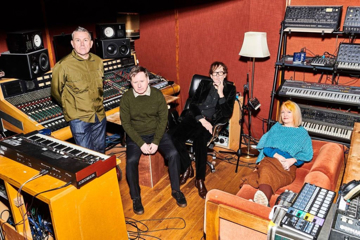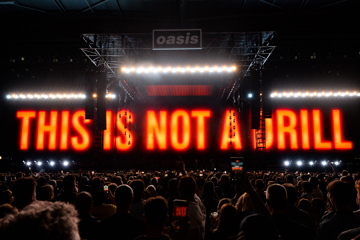Film Carew
Woody Allen is so very, very tired; exhausted, really; his career, at this point, barely running on fumes, eking out those final few gasps of goodwill still lingering from the last time he was actually relevant.
In the past 46 years, Woody Allen has made 42 feature films. I'd call him indefatigable, except the opposite is so obviously true: Allen is so very, very tired; exhausted, really; his career, at this point, barely running on fumes, eking out those final few gasps of goodwill still lingering from the last time he was actually relevant (some would say the late-'80s, I'm more inclined to go for, like, never). Many recent entries in this wildly-overrated 42-film canon haven't actually made it to local screens; the '00s finding literally every second Allen picture (Hollywood Ending, Anything Else, Cassandra's Dream, You Will Meet A Tall Dark Stranger) not screened in Australian theatres. Sadly, the financial success of 2011's Midnight In Paris will likely change this; now every Allen film seemingly due to get a chance to make some box-office cash, and me due to have to sit through it. And To Rome With Love was, in contrast to its daffy fluffiness, an absolute chore to suffer through. This is no surprise: Allen's artistic output is a study in diminishing returns: an auteur who was, contrary to Oscar-approved opinions, never actually great, growing more and more mediocre as he goes. Allen's maniacal consistency can be celebrated as a sign he is the hardest of workers, but the films he makes suggest the filmmaker is, in fact, lazy. His frantic film-a-year pace means that Allen is anything but a stickler; the vast proliferation of clunky takes, under-rehearsed exchanges, phoned-in performances, and point-and-shoot camerawork suggesting (famous) actors and director involved in a succession of pictures in which the stakes are very low; where no one really cares, especially the director himself.
Midnight In Paris was an atypical film for late-career Woody Allen in that it actually had a central theme that was actually explored through narrative: the film a study in the thrall that nostalgia – both personal and cultural – has on the human mind. To Rome With Love is, in contrast, essentially about nothing; Allen's great valentine to the Eternal City a shitty ensemble movie in which a handful of farcical comic set-ups are thrown together. Robert B. Weide's unintentionally-unflattering documentary portrait, Woody Allen: A Documentary, showed the genesis of all of Allen's films: when it's time to embark on a new project, the director rifles through an old shoebox filled with countless story ideas and film titles jotted down, in moments of “inspiration”, on pieces of scrap paper. To Rome With Love feels exactly like a film consisting a four of those pieces of scrap, crumpled up into a ball, and thrown at the wall, to see if the whole thing sticks.
These four stories involve zany comic set-ups that'd make a slaveship of sitcom hacks blush: a nobody (Roberto fucking Benigni) becomes an overnight celebrity for no reason; a timid, neurotic newlywed (Alessandro Tiberi) forces a prostitute (Penélope Cruz, one of the greatest actors of this generation, slumming it horrendously) to pretend to be his wife whilst he attempts to impress his uptight upper-class relatives; a retired opera director (Allen himself, pants pulled up to his armpits) – who is, sigh, married to psychiatrist (Judy Davis; and, like, this feels like Allen not even caring that he's a pale parody of himself) – discovers a star-worthy tenor (Fabio Armiliato) singing in the shower; and an American tourist revisiting his old haunts (Alec Baldwin, not even bothering to hide the fact he's treating this as a free holiday) stages a dialogue with his younger self (Jesse Eisenberg, trying hard) about the foolish affair he's about to undertake, with the story not only pissing away the screen-time for THE alt starlet of our times, Greta Gerwig (dressed down, frownyfaced, and underwritten to the point of being nearly unwritten), but effectively playing like some Fred Flintstone/Great Gazoo-esque 'comic' calamity, only filled with vaguely misogynist rage at 'pseudo-intellectual actresses'. The only interesting thing about To Rome With Love is the way these four intercut stories all have their own completely separate chronology; one takes place in an afternoon, another over months. But that, too, seems accidental; no decision of artistic daring or construction built on thematic meaning, just the happenstantial result of more tossed-together, half-assed, give-a-shit laziness.
The Intouchables is like the most money-makin' French film ever, or some shit; a “crowd-pleaser!” that apparently leaves people dancing in the aisles. It is also utterly fucking awful. Based on a true story (and, yes, before the final credits they show a picture of the real people who inspired the story: this is my least favourite cinematic trend possibly ever), this dire dreck is essentially one long riff on those 'see, a white man drives a car like this!' comic clichés. Here, a jive-talkin', soul-lovin', forever-smilin' African immigrant becomes the personal driver for an uptight, upper-class, wheelchair-bound whiteman. And, see, the black man he talks like this, whereas the whiteman he talks like this! Also: rich people, WTF?!! Want to see a comic riff on how art is really expensive and modern art is total wank? Think that haute cuisine is hilarious, and ever noticed that opera singers are, like, really fat? Then this is the film for you. Oh, and, PS: if this is the film for you, then please don't ever talk to me, you racist, reprehensible, dimwitted dickwad.
Don't miss a beat with our FREE daily newsletter

If the Australian crime docudrama is a genre – and, for the love of God, let's hope it's not – Amiel Courtin-Wilson's first fiction feature, Hail, subverts every expectation thereof; its portrait of toothless, tattooed bogans living in society's, um, underbelly constantly grabbing its kitchen-sink socio-realism and hurling it, skywards, towards scenes of transcendent dreaminess; the documentarian taking to narrative films like a bird taking wing. Of course, Courtin-Wilson is a crazy enough dreamer that he doesn't want to merely shoot birds fluttering in the firmament; instead, he drops a horse from a helicopter, sends a cameraman leaping after it, and shoots the beast hurtling towards its imminent demise. In an era of CGI shortcuts, this wild devotion to an image is a great cinematic talking point (yes, concerned citizens, the horse was already dead; but when 200 million chickens die every day in the bloodied jaws of the industrialised agribusiness machine, quibbling over one death would seem ridiculous to me), and confirmation of Courtin-Wilson as Australian cinema's most interesting young talent. The image is out to evoke Arbo's painting, The Wild Hunt, a phantasmal Norse war scene set in the clouds; a canvas which Courtin-Wilson's camera carefully combs over on opening. Yet the velocity of the descending beast serves as sure symbol for the film's falling protagonist, who is just as surely hurtling towards his own demise. Said protagonist is real-life ex-crim Daniel Jones, whose down-and-out tales serve as the spine for what is, when stripped of its visual beauty (and its awesomely-eccentric – Exuma! Moondog! Terry Riley! –soundtrack), essentially a riff on the revenge movie. Here, another man fresh out of the joint struggles to stay on the straight-and-narrow, and, when tragedy strikes, he sinks into a noir-film nightmare of failed retribution. The meat-and-bones of the narrative are the opposite of revolutionary, but the direction takes Hail to places few Australian features ever dare. Like, y'know, plunging through the clouds, chasing the corpse of a horse, all for a few fleeting seconds of pure, visionary cinema.







